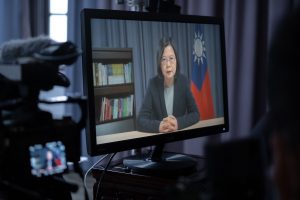On the evening of December 9, Taiwan’s President Tsai Ing-wen delivered pre-recorded remarks at the Washington, D.C.-based Hudson Institute’s end-of-year celebration. That capped off a flurry of virtual remarks at D.C. think tanks of different political leanings, effectively making Tsai’s pitch for deepened cooperation to continue under the Biden administration next year.
A large part of Tsai’s remarks took aim squarely at China. “It is becoming increasingly clear that today, the world is once again being faced with fundamental questions of freedom or authoritarianism,” Tsai said, citing crackdowns in Hong Kong and Xinjiang as well as militarization in the South China Sea. She added Taiwan’s own predicament to the list, pointing to “the increasing provocation from across the Taiwan Strait.”
“I want to be clear: We do not desire this sort of cross-strait relationship,” Tsai said. “…We see a necessity for both sides to find a way to co-exist peacefully, based on mutual respect, goodwill, and understanding.” But in the meantime, she emphasized that Taiwan is bolstering its defenses – both in terms of military preparedness and in terms of combatting disinformation.
Tsai also highlighted reforms to Taiwan’s economy and U.S.-Taiwan cooperation through the Economic Prosperity Partnership Dialogue. She then made a direct pitch for a U.S.-Taiwan trade agreement, a top priority for her administration (especially Tsai has already done the hard domestic work of removing bans on U.S. pork and beef imports, creating no small backlash in Taiwan).
The Hudson Institute is a right-wing think tank, and has previously hosted Trump administration figures like Secretary of State Mike Pompeo and Vice President Mike Pence for major addresses. Tsai was joined in speaking on December 9 by Republican Senator Tom Cotton and Republican Representative Liz Cheney (as well as by Democratic Representative Seth Moulton).
But to cover her political bases, Tsai also delivered remarks via video at the National Democratic Institute (NDI) annual gala on December 8. Democratic House Speaker Nancy Pelosi was being honored at the event. Tsai took the opportunity to pay tribute to Pelosi as well as late Democratic Representative and civil rights icon John Lewis. She also congratulated Kamala Harris on becoming the first women elected as U.S. vice president.
Tsai used her NDI remarks, fittingly, to highlight the shared democratic values of the United States and Taiwan. Beyond that, however, she pointed to shared values on human rights, from gender equality to LGBT rights and beyond. “[T]oday, more than ever, Taiwan is at the forefront in defense of the democratic values that are so important to us all,” Tsai declared.
She concluded her remarks by noting that “the bipartisan consensus” on the U.S.-Taiwan relationship “has never been greater and more robust.”
“I am confident that our friendship will continue to grow closer as we seek new areas of cooperation and collaboration,” Tsai said, indirectly signaling her faith in ties under the incoming Biden administration.
And before the NDI gala, also on December 8, Tsai teleconferenced in to give remarks at the 2020 Taiwan-U.S.-Japan Trilateral Indo-Pacific Security Dialogue, organized by the Project 2049 Institute in the U.S., the Japan Institute of International Affairs, and the Prospect Foundation in Taiwan. Tsai underlined that Taiwan is facing a direct military threat from “authoritarian forces” (meaning China, of course, although she did not specifically say that).
“Only through engagement and by working together can we tackle the threats and challenges that beset our region and the world,” Tsai said. In particular, she praised the progress made by the Global Cooperation and Training Framework, set up in 2015 by the U.S. and Taiwan. Japan joined in 2019, making it a venue for trilateral cooperation as well. “I firmly believe that institutionalizing GCTF will help it become a hub for regional cooperation, particularly over non-traditional security issues that threaten countries in the Indo-Pacific,” Tsai added.
Overall, Tsai’s spate of virtual diplomacy touched all the bases of U.S.-Taiwan cooperation: the China challenge, economic ties, shared democratic values, as well as bilateral and multilateral security cooperation. Her agenda is clear for the Biden administration – the question now is what steps they will take to meet it.

































